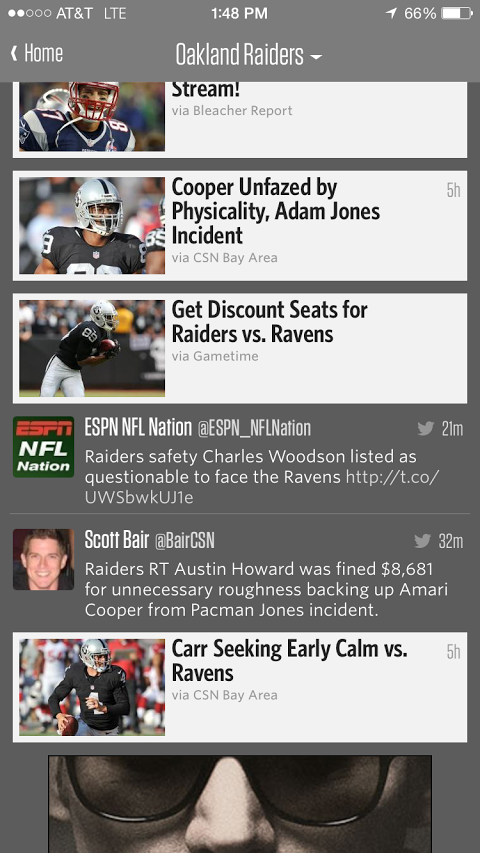Save 50% on a 3-month Digiday+ membership. Ends Dec 5.

The traditional knock against mobile apps is that they err too far on the closed side of things, at least to the comparatively open mobile Web. But with deep linking, which lets apps link directly to specific parts of other apps, publishers are starting to find ways to break down the walls between their apps and everyone else’s.
Bleacher Report recently inked a deal with last-minute sports ticketing app Gametime to help sell game tickets directly from the sports site’s Team Stream app. Users who scroll through the news feed for their favorite team will periodically see links to tickets for that team’s upcoming games. If users have the Gametime app installed, clicking those links will send them directly to a buy page within the app. Users who don’t have the app will be sent to the App Store to download it.
“If you’re an Oakland Raider fan and you’re reading previews about upcoming games, then it obviously it makes sense to integrate that kind of commerce opportunity within the app,” said Bleacher Report business operations vp Alex Vargas. “It only works because it makes sense within the context of that experience.”
The deal is unique in that it’s one of the very few examples of publishers integrating deep linking into their mobile apps. The tech, which has only been around for a few years, has been mostly in the domain of big tech companies, particularly those with a commerce angle. Uber, for example, teamed up with Google to let Google Maps users hail Uber rides from with the app. With the launch of iOS9, Apple started to index app content, letting users search within all their apps directly from iOS.

And publishers might be missing out, not only on new integrations that could improve their apps, but on revenue as well. Vargas wouldn’t go into detail, but the deal is likely to open up a significant new revenue stream for Bleacher Report, which can charge based on how many app installs it drives or how many ticket sales it helps facilitate. Gametime chief revenue officer Colin Evans said the company has similar deals with music publishers in the works.
Deals like this are still few and far between, but it hints at what could become an economy of apps competing for deep-linked placements, similar to real-time bidding on the Web, according to Noah Klausman, CEO of Deep Link, which helps developers build deep linking into their apps. “On the business side this is a real way that Apple could take some of Google’s control over the discovery side of things,” he said.
Ad position: web_incontent_pos1
Deep linking could also change how people discover new apps and reengage with the ones they’ve already downloaded. While the average smartphone user has 42 apps on their phone, most use between one and four a day, according to a 2014 Nielsen report. Deep linking is one potential fix for that.
“If you can remind people to use your app more often, then generally being on people’s homescreens will become slightly less important,” said Jordan Cooker, CEO of news app Wild Card, which uses deep linking to let users link directly to story collections within the app.“This is a good thing for all apps, not just those from publishers.”
More in Media

What publishers are wishing for this holiday season: End AI scraping and determine AI-powered audience value
Publishers want a fair, structured, regulated AI environment and they also want to define what the next decade of audience metrics looks like.

Digiday+ Research Subscription Index 2025: Subscription strategies from Bloomberg, The New York Times, Vox and others
Digiday’s third annual Subscription Index examines and measures publishers’ subscription strategies to identify common approaches and key tactics among Bloomberg, The New York Times, Vox and others.

From lawsuits to lobbying: How publishers are fighting AI
We may be closing out 2025, but publishers aren’t retreating from the battle of AI search — some are escalating it, and they expect the fight to stretch deep into 2026.
Ad position: web_bfu